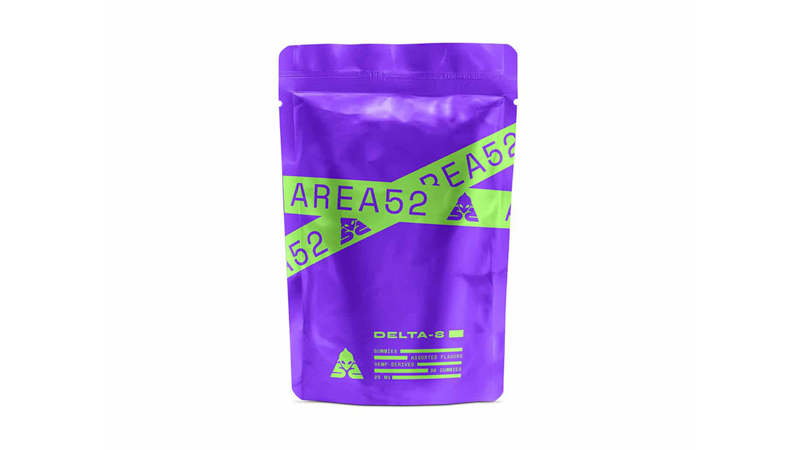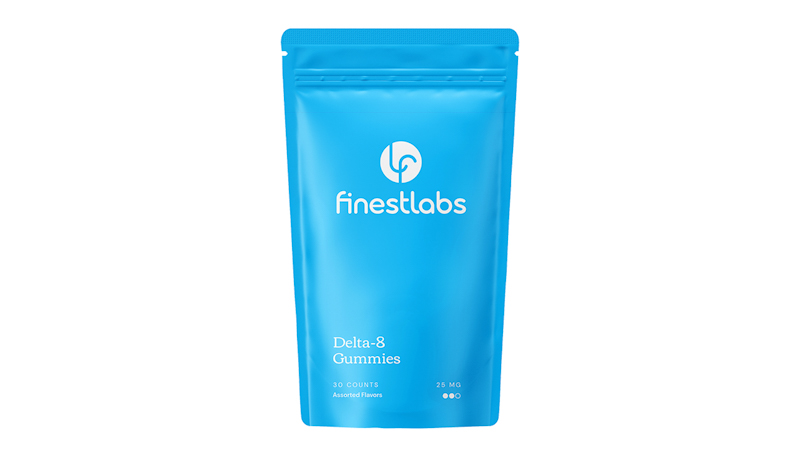Best Delta 8 THC Gummies for Pain in 2023
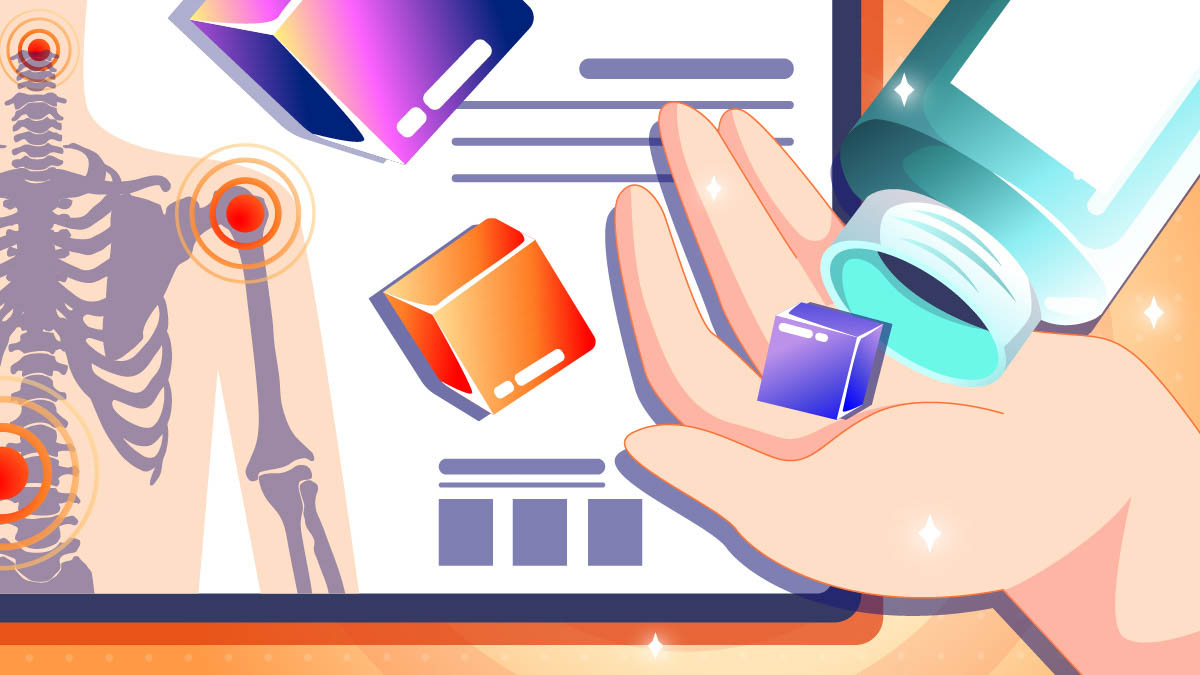
Delta 8 THC gummies are a good alternative to CBD gummies for easing different types of pain.
Delta 8 is a less potent analog of delta 9 THC — the one you can find in marijuana.
It comes with similar health benefits — including pain reduction — but it doesn’t get you as buzzed as the classic version of THC.
The best delta 8 THC gummies are another big thing on the market.
However, not all such products are made according to the same high standards.
Today, I’ll show you the top 10 Delta 8 brands that make the best gummies with all-natural ingredients and from non-GMO, locally-grown hemp.
I’ll also explain how delta 8 THC works for pain — and whether or not it’s legal in your state.
Best Delta 8 THC Gummies for Pain
- Area 52 – Best Delta 8 Gummies for Pain Overall
- Finest Labs – Best Delta 8 Gummies for Beginners
- 3Chi
- Delta8 Pro
- Diamond CBD – Chill Plus
- Everest
- Moonwlkr
- Binoid
- Delta Effex
- Exhale Wellness
1. Area 52 Delta 8 THC Gummies (Best Overall)
Get 15% off all Area 52 products. Use code “CFAH” at checkout.
Area 52 has quickly made it to the top of the league in the delta 8 THC space. This company specializes in making premium delta 8 gummies from pure distillate. Not only that but Area 52 also offers other forms of delta 8 THC, such as tinctures and vapes.
The company offers two types of delta 8 gummies: regular and UFO (infused with CBD).
The regular D8 gummy is quite strong, with 25 mg of delta 8 THC in each gummy. The cubes come in three assorted flavors: Pineapple, Green Apple, and Strawberry. The D8 concentration makes a little go a long way; most users take 1-2 gummies throughout the day to experience a moderate buzz.
The UFO gummies are made with a 5:1 ratio of CBD and THC, offering the real full spectrum. This composition of cannabinoids and terpenes allows the user to leverage the entourage effect — a biological phenomenon where these molecules work together to amplify their health benefits and mitigate potentially unwanted effects.
A great thing about these gummies is that they’re also free from artificial flavorings and sweeteners. That’s particularly important considering the abundance of sub-par products that are churned on the booming market.
2. Finest Labs Delta 8 THC Gummies (Best for Beginners)
Finest Labs is the go-to choice for new consumers. Its gummies come with a convenient dose of 25 mg of delta 8 THC in each cube.
These treats contain a broad-spectrum hemp extract infused with strain-specific terpenes (Blueberry). The effects are more physical than mental, and I find them more tranquilizing than the gummies from Area52.
If you like to microdose delta 8 THC, cutting these gummies in half will help you achieve the perfect balance between relaxation and functionality.
3. 3Chi Delta 8 THC Gummies
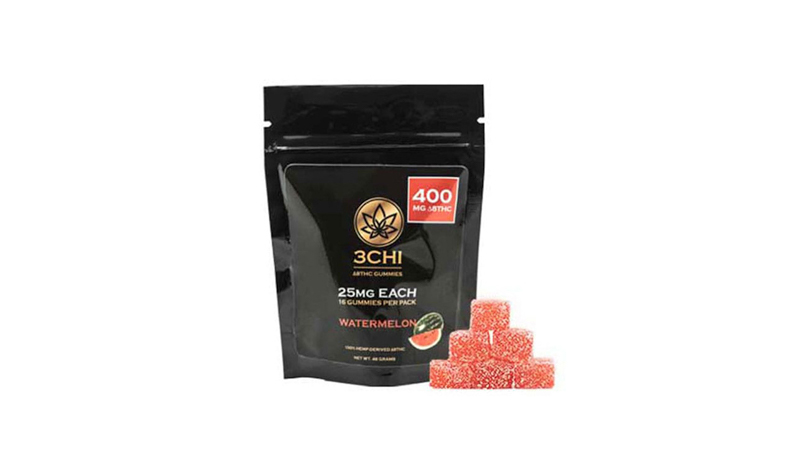
3Chi is one of the pioneering brands in the delta 8 THC market. The company was one of the first companies to enter the scene and offer a broad range of delta 8 THC extracts, including tinctures, vapes, gummies, flowers, and moonrocks.
The 3Chi gummies come in a very tangy raspberry flavor. You can choose between a classic version containing pure delta 8 THC (distillate) and a blend of delta 8 with CBN. The second version is formulated to help with sleep quality due to the sedating effects of CBN.
Both options come with 25 mg of delta 8 THC per gummy; you can buy them in packs of either 8 or 16.
Despite a decent reputation and good transparency, 3Chi doesn’t share any details about the source of its hemp. If you’re looking for a 100% transparent vendor, I suggest checking out the two above brands.
4. Delta 8 Pro
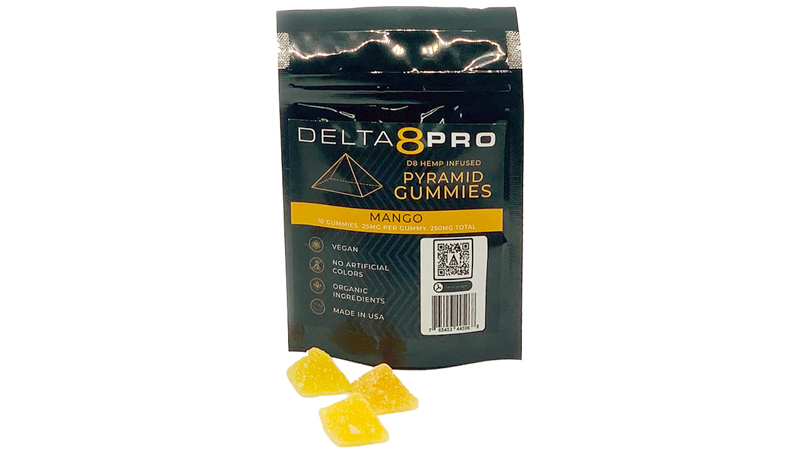
Delta 8 Pro is one of the biggest players on the American scene. The company offers a full range of delta 8 THC products, including vapes, dabs, tinctures, moon rocks, flower, gummies, and more.
Delta 8 Pro’s Pyramid Gummies offer a healthy dose of 25 mg of delta 8 THC per gummy. They’re vegan and made with all-natural ingredients, including flavorings and colorings. Unlike some other delta 8 gummies, they don’t have a hempy aftertaste; instead, you can enjoy a medley of delicious fruity flavors and a nice cognitive buzz.
Unfortunately, these gummies aren’t tested for pesticides and heavy metals. The only results available on the Delta 8 Pro website refer to three cannabinoids: delta 8 THC, delta 9 THC, and CBD. The company’s refund program also isn’t customer-friendly. Once you open and try the products, you can’t send them back.
5. Chill Plus – Diamond CBD
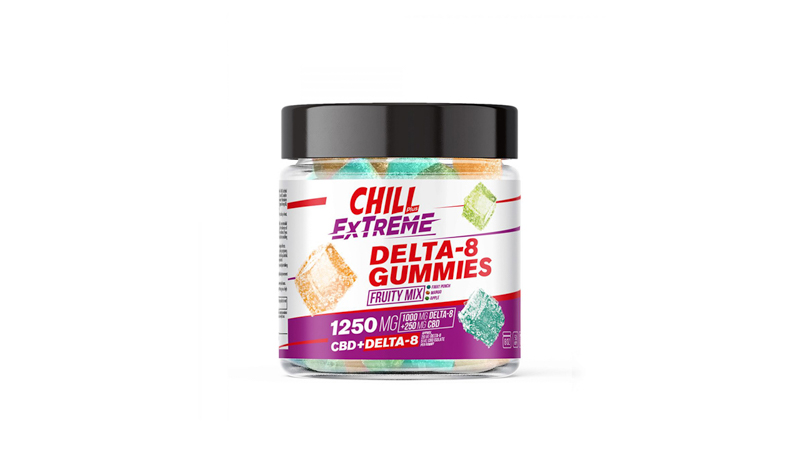
Chill Plus is a recent addition to Diamond CBD’s line-up. Diamond CBD is one of the most popular manufacturers of hemp extracts; after making its name in the CBD space, the brand has stepped up its game and introduced a selection of delta 8 extractions.
The Chill Plus Delta 8 Extreme Force Gummies are available in three strengths: 500 mg, 1000 mg, and 4000 mg per jar. Each variant comes in one of the six flavors: Blueberry, Island Mix, Mango, Original, Sunshine Mix, and Watermelon.
If you’re not sure which version to choose, you can order them in sample packs. However, the gummies aren’t tested for contaminants, and the variety of different options may be confusing if you’re new to delta 8 THC.
6. Everest
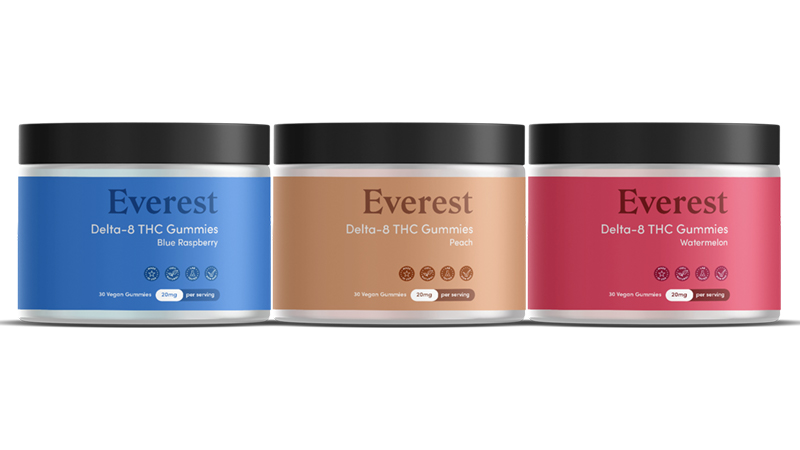
Everest prioritizes delta 8 THC gummies from organically-grown hemp. These juicy cubes are made without gluten and animal derivatives, making them a great alternative for vegans and people with allergies to grains.
Each gummy has 20 mg of delta 8 THC; they’re available in only one flavor — Blue Raspberry — which tastes nice and doesn’t leave an artificial aftertaste on the palate, unlike other gummies in this price range.
Everest double-tests its gummies in a third-party laboratory for quality and safety. If only the brand had created more options when it comes to flavors, formulas, and potencies — I’d place them much higher on my list of the best delta 8 THC gummies for pain.
7. Moonwlkr
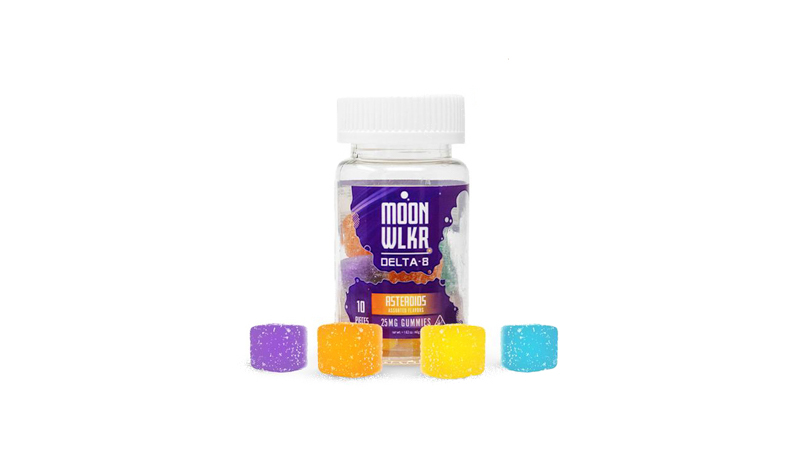
Moonwlkr has one of the most amazing brandings on the delta 8 scene; fortunately, the company combines smart marketing with high-quality ingredients and decent transparency. So far, Moonwlkr offers only gummies and vapes.
The gummies are made with organic hemp and infused with cannabis-derived terpenes to add specific effects and unique flavors and aromas to each variety. The choice includes Sour Diesel, Watermelon Zkittlez, Blue Dream Berry, Pineapple Express, and OG Kush.
What I don’t like about these gummies, however, is the delicate harsh delta 8 aftertaste on their candy-like notes. Moonwlkr also uses artificial colorings in its gummies, which don’t pair well with the quality of the other ingredients.
8. Binoid
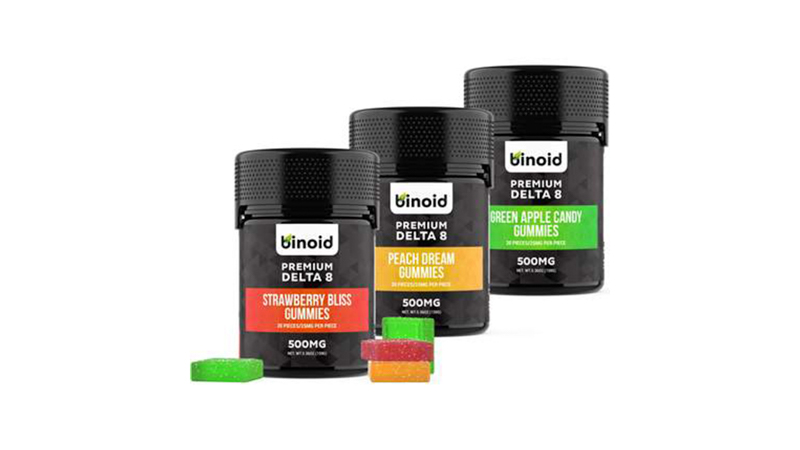
Binoid offers various cannabinoid-based products, including delta 8 THC, delta 10 THC, and THCV.
The gummies come with delta 8 THC distillate, which is infused into their base rather than sprayed, setting them apart from most mediocre gummies on the market.
Binoid’s D8 gummies come in three flavor options: Sour Green Apple Candy, Strawberry Bliss, Peach Dream, and a mixed jar containing an assortment of all these flavors.
Each gummy packs 25 mg of delta 8 THC, with 20 gummies per jar. The formula is vegan, so you can take them regardless of your ethical choices. The gummies also provide a nice balance of sweet and sour flavors.
The sad part is that Binoid doesn’t have any reward programs, discounts, or discounts, making its products more expensive than the competition.
9. Delta Extrax
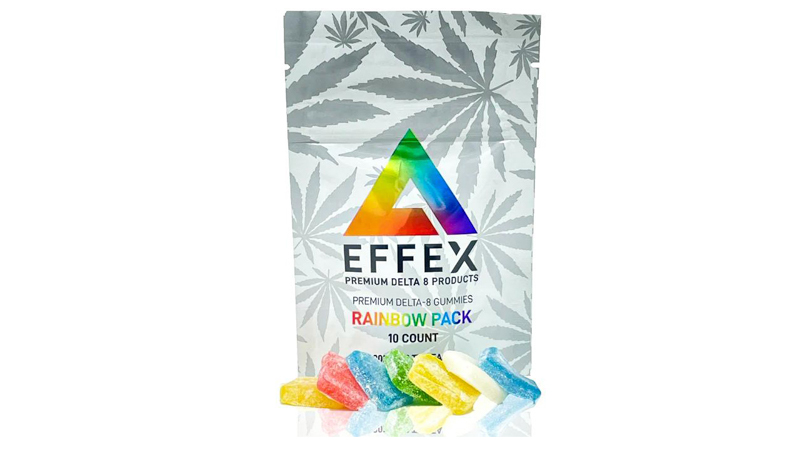
Formerly known as Delta Effex, Delta Extracts specializes in delta 8 and delta 10 THC products. It’s a daughter brand of Savage Enterprises, one of the most prominent names in the vaping industry.
Delta Extrax’s delta 8 THC gummies offer 20 mg of delta 8 per piece and contain sugar, corn syrup, water, gelatin, and pectin. Each batch is tested for potency and purity to ensure the gummies are safe.
Unfortunately, the gummies aren’t suitable for people on plant-based diets due to gelatin, which is a shame because they have great flavors and texture.
10. Exhale Wellness
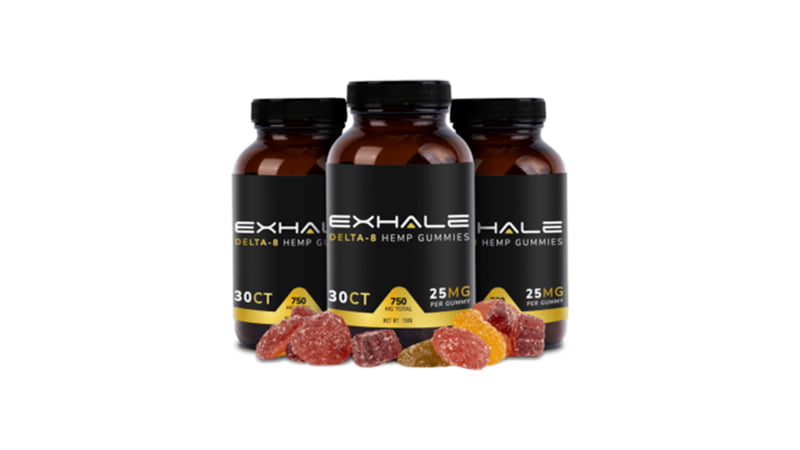
Exhale Wellness offers some of the best delta 8 THC gummies sourced from non-GMO hemp and without synthetic additives. Although the company is among the younger brands in the delta 8 space, it has already garnered much attention thanks to the high potency of its gummies.
Each gummy contains a whopping dose of 50 mg of delta 8 THC. You can also choose a regular version — with 25 mg of delta 8 per serving. The gummies are available in an assortment of five fruity flavors achieved with fruit juices and concentrates.
The only minus is that Exhale Wellness doesn’t have any low-strength gummies or flavored options in its collection.
What Are Delta 8 THC Gummies?
Delta 8 THC gummies are pretty much like regular weed gummies, except for the main ingredient.
There are three types of THC. The one that occurs in marijuana plants is referred to as delta 9 THC — or simply THC for short.
But did you know that delta 9 has a close relative with similar benefits but with less trippy effects?
It’s known as delta 8 THC.
It’s a similar cannabinoid that has an almost identical chemical composition — but with one minor difference in the arrangement of its atoms.
Delta 8 THC comes with a double bond at the 8th carbon chain, while delta 9 has this bond on the 9th chain.
This makes it about 50% less potent in terms of its cognitive effects.
Delta 8 THC gummies are produced by infusing delta 8 THC distillate — the active form of this compound — into a gummy candy base. The texture and flavoring make delta 8 gummies particularly enjoyable who don’t like to smoke or vape cannabis products (or use tinctures).
Not to mention that gummies come with a premeasured dose in each serving and have a longer shelf-life than other forms of delta 8.
What Do Delta 8 THC Gummies Feel Like?
The effects of delta 8 THC gummies are similar to those produced by regular weed gummies — but they’re not as strong as the high from delta 9 THC.
The psychoactive potential of delta 8 THC is mild; I mean, you can get high off of it, but you’d need to eat twice as many delta 8 THC gummies as you would with weed-infused ones. The high also won’t be as grounding and paranoid as to when you eat too many weed edibles.
High doses of delta 9 THC are known for their potential to trigger anxiety and paranoia. That’s why some people choose to avoid classic weed products.
Delta 8 THC has fewer side effects and makes it easy to avoid mental distress.
What Are the Health Benefits of Delta 8 THC Gummies?
The National Cancer Institute reports that delta 8 THC can bind to the CB1 receptor throughout the body. These receptors make for our endocannabinoid system, helping our body regulate and maintain internal balance (homeostasis).
Since it has a weaker affinity with the CB1 receptor than delta 9 THC, the cognitive buzz won’t be as pronounced. However, that doesn’t mean that you’ll experience fewer benefits — or that they will be less noticeable than with regular weed.
Here are some potential health benefits of delta 8 THC
- Neuroprotectant: some studies suggest that one of delta 8 THC health benefits is it could help people produce Acetylcholine — a neurotransmitter responsible for cognition, memory, neuroplasticity, and arousal.
- Appetite stimulant: a 2004 study on cannabis and appetite control found that even low doses of delta 8 THC could stimulate an increase in food intake.
- Antiemetic: based on the findings from a 1995 study, delta 8 THC can reduce nausea in children undergoing chemotherapy. The authors of the study saw a 100% success rate in reducing their nausea among over 480 participants in total.
- Analgesic: everybody goes through different types of pain from time to time, but researchers have observed that delta 8 THC can relieve some of that pain by mitigating pain transmission from neurons to the brain.
- Anxiolytic: delta 8 THC binds to the CB1 receptors. Some researchers have observed it attaching to the CB2 receptors as well. This means that delta 8 THC can effectively support a healthy stress response in the body and thus reduce anxiety.
How Delta 8 THC Gummies Work for Pain

Wondering how delta 8 THC works for pain?
Well, since delta 8 is a milder analog of delta 9 THC, it can provide similar health benefits, but you’ll likely need a higher dose to achieve the same therapeutic effect. Delta 8 THC may come in handy if you’re sensitive to the intoxicating effects of THC and easily get anxious after using too much marijuana.
Here are some of the mechanisms delta 8 THC uses to alleviate pain.
Reduced Inflammation
Cannabinoids were proposed as novel anti-inflammatory drugs by a 2009 review of scientific literature.
The review mentions how CBD and different versions of THC can reduce inflammation through multiple pathways, including adenosine receptors and selective immunosuppression.
The mechanism involves the CB2 receptor, through which cannabinoids modulate the immune response.
In a healthy body, they modulate the communication between your immune cells; in an aggressive immune system, they tone it down and can directly reduce inflammation.
Mitigated Pain Signals
THC is also known to inhibit the release of neuropeptides from the presynaptic nerve ending that normally cause pain through signaling it to the brain. When this mechanism becomes blocked, pain signals are dampened, and so is the experienced discomfort.
On top of that, cannabinoids activate inhibitory pain pathways, modulate postsynaptic neuron excitability, and reduce neural inflammation.
Improvement of the Endocannabinoid System
In a perfect world, your endocannabinoid system would take care of all the potential damage that environmental stressors can cause to your body. However, since modern times are constantly putting a lot of stress on our shoulders, the endocannabinoid system (ECS) can become dysfunctional.
When the ECS can’t produce enough of its endocannabinoids for an extended time, it can breach the balance between other systems and organs in your body — resulting in the deterioration of your health.
Since cannabinoids from cannabis — like CBD, delta 9 THC, and delta 8 THC — interact with the same receptors as your endogenous cannabinoids, using these molecules can naturally support the performance of the ECS — restoring the aforementioned balance.
Endocannabinoids control a wide range of functions, including immune response and pain perception; that’s why cannabis is so often used in the treatment of acute and chronic pain.
Muscle Relaxation
Clinical studies on Sativex — an oral spray with a ratio of 1:1 between THC and CBD — have shown that the medication can reduce muscle spasticity in patients with multiple sclerosis.
Cannabinoids are powerful muscle relaxants that can block the release of neurotransmitters known to induce muscle rigidity and spasms. Since delta 8 THC is about twice less potent than delta 9, it could provide similar results when used in higher doses.
How Many Delta 8 THC Gummies Should I Take for Pain?
Although direct studies on the effects of delta 8 THC on pain are few and far between, some research indicates general dosage guidelines for reducing chronic pain.
One such study tested the efficacy of delta 8 THC for pain and found that doses of 40–80 mg of delta 8 were effective at treating pain — noting that greater efficacy was reported in the cases of mild chronic pain than severe.
In order to reach an effective dose for severe chronic pain, researchers would need to use a higher dose of delta 8 THC — but they didn’t expand their study to that point.
Using the above “criteria,” you can start with 1–1 ½ gummy at a time. Once you eat it, wait for up to 2 hours to let delta 8 kick in. After another few hours, assess how you feel and decide if you were good with an extra dose the other day.
At this dosage, you should be able to experience slight cerebral stimulation and an elevated mood. Increasing the dosage to 2 gummies may result in a more mellow buzz — but one during which you can still function normally.
Are Delta 8 THC Gummies Safe for Pain?
The best part about using delta 8 THC gummies for pain is that the cannabinoid has a decent safety profile.
Just to make it clear, to date, there has been no record of a fatal overdose from cannabinoids. Death from using too much cannabis is physically impossible because cannabinoids don’t affect the brain stem area responsible for respiratory functions.
Since delta 8 THC is about half as potent as delta 9 THC, the likelihood of getting anxious or paranoid after taking too much is also lower.
That being said, delta 8 THC can cause a few mild side effects, including:
- A serious case of munchies
- Dry mouth
- Dry, red eyes
- Altered perception of time
- Dizziness
- Sleepiness
- Problems with coordination
Keep in mind that delta 8 THC is still intoxicating, so you shouldn’t drive vehicles or operate on heavy machinery after eating delta 8 THC gummies for pain.
Is Delta 8 THC Legal?
From a legal standpoint, delta 8 THC is in a grey area.
On the federal level, delta 8 THC is legal as long as it is derived from hemp. That’s because the 2018 Farm Bill legalized all hemp derivatives as long as they contain less than 0.3% of delta 9 THC (or less).
Delta 8 THC is obtained through a special conversion process that uses CBD and special solvents. This allows the manufacturer to keep the delta 9 THC levels within legal limits.
However, states have the right to implement their own regulations with regard to federal law. Given the controversy around the production of delta 8 THC, at least 18 states have decided to ban delta 8 products, including:
- Alaska
- Arizona
- Arkansas
- Colorado
- Connecticut
- Delaware
- Kentucky
- Idaho
- Iowa
- Michigan
- Mississippi
- Montana
- New York
- North Dakota
- Rhode Island
- Utah
- Vermont
- Washington
If you want to buy delta 8 THC gummies for pain, make sure to check if they’re legal in your state to avoid trouble.
What to Look for When Shopping for Delta 8 THC Gummies
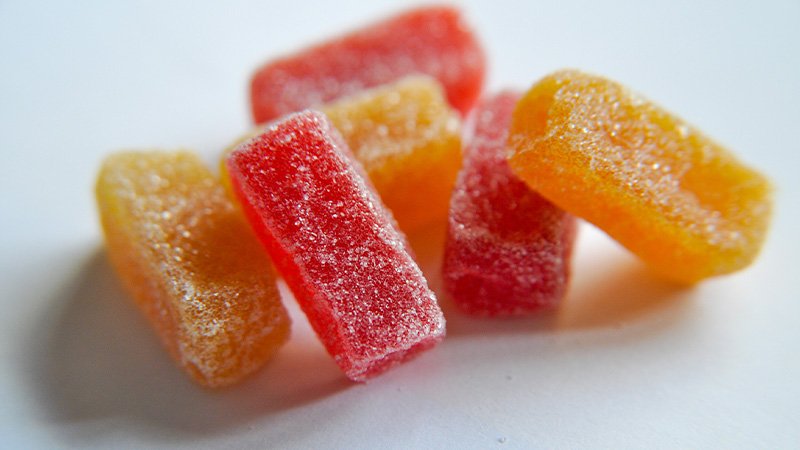
As mentioned earlier, no two Delta 8 THC products are made the same. The market is still unregulated, so there’s no standardization when it comes to the quality of ingredients, extraction methods, and lab testing.
Given this, if you want to make sure you’re getting the most value for your money, check out the following quality criteria when buying delta 8 THC gummies online.
Hemp Source
Hemp plants are excellent bioaccumulators. That can be both good and bad because hemp can absorb everything from its environment — including the good and bad substances.
When grown in clean and nutrient-rich soil, the plants will yield high-CBD flowers with considerable concentrations of terpenes.
On the other hand, poor growing conditions will result in contaminated plant material with very little delta 8 THC to extract.
The best delta 8 THC gummies come from non-GMO, organic hemp grown in the USA.
Extraction Method
There are numerous ways to extract CBD before converting it into delta 8 THC. CO2 extraction is the golden standard because it ensures the proper purity and consistent potency among product batches without using extra heat or toxic solvents.
Reputable companies also don’t use bleaches to make their products appear “pure.” They’re also good at purging the chemicals required for the said conversion so that no residue is found at the bottom of the extract.
Potency
Since delta 8 THC is about half as potent as delta 9 THC, gummies for pain should contain higher doses than regular weed gummies. If you benefit from 15 mg of THC for pain, your dose of delta 8 will be somewhere around 30–40 mg. Anything below 20 mg may be cost-prohibitive in the long run.
THC/CBD Ratio
Some brands leverage the entourage effect in their delta 8 THC gummies by combining the cannabinoid with CBD. Together, these two compounds amplify their therapeutic properties, so if you’re using delta 8 THC to improve overall well-being, such gummies can be a bull’s eye. If you’re looking for a more pronounced cognitive experience, delta 8 alone should suffice.
Terpenes
The effects of delta 8 THC are quite bland when you consume it alone. You feel the buzz, but it doesn’t get you in any particular direction. That’s why manufacturers add terpenes to their formulas. Delta 8 THC gummies with additional terpenes are not only tastier, but they also contribute to the entourage effect by adding their own therapeutic properties to the palette of effects.
Lab Testing
Third-party testing is the generally agreed golden standard for safety in the hemp industry. Independent laboratories can provide a complete chemical analysis of the product, including the potency of delta 8 THC, other cannabinoids, terpenes, and common contaminants, such as pesticides, heavy metals mycotoxins, residual solvents, or bleaches. Brands that don’t provide certificates of analysis (COA) for their products should be avoided because you can’t be sure what’s inside their delta 8 THC gummies.
Summarizing the Best Delta 8 THC Gummies for Pain
Delta 8 THC has many of the same benefits as delta 9 THC — including pain relief. At the same time, it’s twice less potent than its cousin, which makes it a great alternative for people who don’t get on well with the psychoactive properties of marijuana.
That’s why delta 8 THC gummies are a trending topic. However, as with any booming market, proper research is essential if you want to avoid sub-par products that can be dangerous to your health. Making high-quality delta 8 THC gummies takes time, experience and requires a high-tech laboratory — not to mention the staff that needs to handle the process.
Feel free to check out my recommendations for the best delta 8 THC gummies for pain, or if you have the time, do your own research and compare different brands and their products to get the best match for your needs.
Sources:
- National Cancer Institute. (2022). Delta-8-tetrahydrocannabinol. Cancer.gov [1].
- Revuelta, A. V., Cheney, D. L., Costa, E., Lander, N., & Mechoulam, R. (1980). Reduction of hippocampal acetylcholine turnover in rats treated with (-)-delta 8-tetrahydrocannabinol and its 1′,2′-dimethyl-heptyl homolog. Brain research, 195(2), 445–452.
- Avraham, Y., Ben-Shushan, D., Breuer, A., Zolotarev, O., Okon, A., Fink, N., Katz, V., & Berry, E. M. (2004). Very low doses of delta 8-THC increase food consumption and alter neurotransmitter levels following weight loss. Pharmacology, biochemistry, and behavior, 77(4), 675–684.
- Abrahamov, A., Abrahamov, A., & Mechoulam, R. (1995). An efficient new cannabinoid antiemetic in pediatric oncology. Life sciences, 56(23-24), 2097–2102.
- Nagarkatti, P., Pandey, R., Rieder, S. A., Hegde, V. L., & Nagarkatti, M. (2009). Cannabinoids as novel anti-inflammatory drugs. Future medicinal chemistry, 1(7), 1333–1349 [5].
- Vučković, S., Srebro, D., Vujović, K. S., Vučetić, Č., & Prostran, M. (2018). Cannabinoids and Pain: New Insights From Old Molecules. Frontiers in pharmacology, 9, 1259 [6].
- Manzanares, J., Julian, M., & Carrascosa, A. (2006). Role of the cannabinoid system in pain control and therapeutic implications for the management of acute and chronic pain episodes. Current neuropharmacology, 4(3), 239–257 [7].
- Barnes M. P. (2006). Sativex: clinical efficacy and tolerability in the treatment of symptoms of multiple sclerosis and neuropathic pain. Expert opinion on pharmacotherapy, 7(5), 607–615 [8].
